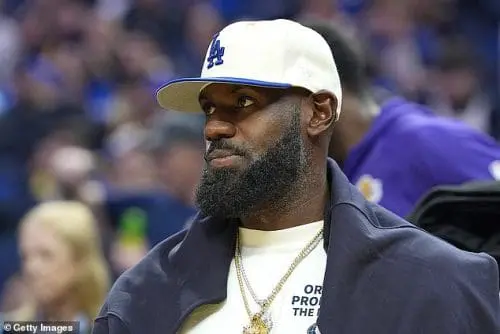By Ghana News
Copyright ghanamma

A Los Angeles Lakers supporter has filed a lawsuit against basketball icon LeBron James, claiming the NBA star’s marketing campaign misled him into purchasing expensive game tickets under false assumptions about an impending retirement announcement.
Andrew Garcia, 29, submitted legal documents in Los Angeles County Small Claims Court seeking $865.66 in damages after what he describes as a costly misunderstanding. The lawsuit centers on James’s social media teaser for “The Second Decision,” which many fans interpreted as a signal that the 40-year-old athlete would announce his retirement from professional basketball.
The controversy began when James posted a cryptic video on social media that referenced his famous 2010 announcement, when he revealed his move from Cleveland to Miami in a televised special simply called “The Decision.” The new teaser convinced Garcia and numerous other basketball enthusiasts that the four-time NBA champion was preparing to hang up his jersey ahead of what would be his 23rd season in the league.
Garcia’s reaction was immediate. He rushed to Ticketmaster and purchased two tickets valued at $432.83 each for a Lakers game against the Cleveland Cavaliers scheduled for March 31, 2026. The matchup held special significance because Cleveland was James’s former team, and Garcia believed he was securing seats to witness the legend’s final appearance against the Cavaliers.
However, when James unveiled “The Second Decision” the following day, it turned out to be a commercial advertisement for Hennessy cognac. The basketball star had signed a creative partnership with the spirits brand in 2024, and the announcement was simply promoting their collaboration rather than signaling the end of his playing career.
Garcia has accused James of fraud, deception, and misrepresentation, arguing that the tickets lost nearly all their value once it became clear the player wasn’t retiring. He told reporters that his purchase decision was entirely dependent on believing James would soon leave the sport.
The timing of the lawsuit has raised questions about consumer expectations and celebrity marketing tactics. James will become an unrestricted free agent at the end of the 2025-26 season, when he turns 41, leading many analysts to speculate that year could indeed mark his final chapter in professional basketball. But there’s been no official confirmation from the player himself about retirement plans.
Legal experts suggest Garcia faces an uphill battle in court. No one compelled fans to purchase tickets at premium prices, and James made no explicit statements about retiring in his promotional material. Additionally, the unpredictable nature of professional sports means any game could potentially be an athlete’s last, particularly for someone in their forties competing at the highest level.
The incident has sparked broader conversations about the intersection of sports marketing and fan expectations. While James’s promotional strategy successfully generated buzz and captured widespread attention, it also demonstrated how easily social media teasers can be misinterpreted when they borrow from significant moments in an athlete’s history.
James’s original “Decision” broadcast in 2010 remains one of the most memorable and controversial moments in NBA history, attracting massive viewership while also drawing criticism for its theatrical approach to a free agency announcement. The new Hennessy campaign clearly aimed to capitalize on that cultural moment, though perhaps without fully anticipating how fans might react to the nostalgia.
For Garcia, the lawsuit represents what he views as a matter of principle. Whether a small claims court will agree that purchasing tickets based on speculation about retirement constitutes actionable fraud remains to be seen. The case could set an interesting precedent about the responsibilities celebrities bear when their marketing campaigns touch on deeply personal career decisions that impact fan behavior and ticket markets.